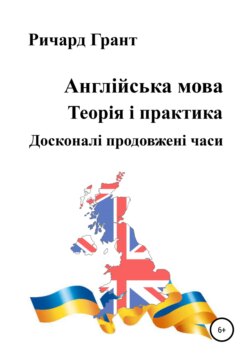
000
ОтложитьЧитал
Досконалі тривалі часи позначають дії, що почалися до моменту мови (Рresent Perfect Continuous) або до якогось моменту в минулому або майбутньому (Past Perfect Continuous, Future Perfect Continuous) і тривають аж до цього моменту або після нього.
Теперішнiй досконалий продовжений час – The Present Perfect Continuous Tense
Present Perfect Continuous Tense – теперішній досконалий продовжений час, описує дію, яка почалася в минулому, досі триває або тільки що закінчилася.
З цим часом часто вживаються такі обставини часу: for – протягом, since – з якогось часу, recently – недавно, днями, all morning/day/week – весь ранок/день/тиждень, lately – останнім часом.
Утворювання Present Perfect Continuous Tense
Розмовне речення – Subject + have/has + been + verb (-ing) + …
It has been raining all day long. I’m sick and tired of this weather. – Дощ іде весь день. Мене дістала ця погода.
Заперечне речення – Subject + have/has + not + been + verb (-ing) + …
He hasn’t been working all weekend. He is lying. – Він не працював усі вихідні. Він бреше.
Питальне речення – (Question word) + have/has + subject + been + verb (-ing) + …?
How long have you been dating him? – Як довго ти з ним зустрічаєшся?
Короткі відповіді
При відповіді на питання, що передбачає відповідь так чи ні, використовуються наступні шаблони:
Have they been sleeping? – Yes, they have. – (позитивна відповідь) – No, they have not. – (негативна відповідь)
Has he been training? – Yes, he has. – (позитивна відповідь) – No, he has not. – (негативна відповідь)
Вправа 1
Розкрийте дужки, вживаючи дієслова у Present Perfect Continuous Tense.
1. The vegetables (to boil) since 10 o’clock. 2. Helen (to wash) the dishes for fifteen minutes. 3. My brother (to stay) with us for three weeks, he hasn’t left yet. 4. She (to live) in this house for five years but she doesn’t know her neighbors. 5. He (to wait) for her answer for six months. 6. My classmates (to write) a dictation since the beginning of the lesson. 7. It (to rain) hard since morning, I can’t go for a walk. 8. The text is very difficult, the students (to translate) it since the lesson began. 9. My sister (to send) job applications for 3 months. 10. Sam (to drive) a car for five hours now. 11. How long you (to look) for her? It’s strange that you can find her nowhere.
Вправа 2
Розкрийте дужки, вживаючи дієслова у Present Perfect Continuous Tense.
1. I (to paint) the fence since morning but I haven’t finished it yet. 2. I (to try) to find my documents since last Sunday. 3. I (to look) for information on the subject since last Friday. 4. The sun is shining but the ground is wet because he (to water) the garden for a long time. 5. You (to talk) for almost an hour without stopping. 6. They (to learn) Japanese for a couple of years. 7. Molly (to paint) this picture for three days now. 8. She looks very tired. What she (to do)? 9. The boss is very angry, because his secretary (to type) the report for five hours. 10. Father (to drill) holes in the wall since noon. 11. The tourists (to do) the sightseeing since nine o’clock.
Вправа 3
Розкрийте дужки, вживаючи дієслова у Present Perfect Continuous Tense.
1. He is a good player, because he (to play) chess since he was five. 2. My brother (to play) computer games for 3 hours. 3. You (to work) as a computer programmer for more than fifteen years. 4. I (to listen) to you very carefully. 5. We can’t see paths in the garden, because it (to snow) heavily during the whole night. 6. The wind (to blow) since yesterday. 7. He (not to take) his medicine for the last week. 8. He (to write) his summary since the lecture began. 9. My grandfather (to collect) coins since he was a boy. 10. I (to buy) food here since I came to this town. 11. We (to save) the money for a holiday for a year. 12. Andy and Den (to discuss) the plans for their winter holidays for two hours now. 13. The states of the roads are very bad here, though they (to repair) them for the last few years.
- Англійська мова. Теорія і практика. Іменник
- Англійська мова. Теорія і практика. Артикль
- Англійська мова. Теорія і практика. Займенник
- Англійська мова. Теорія і практика. Числівник
- Англійська мова. Теорія і практика. Сполучник
- Англійська мова. Теорія і практика. Прикметник
- Англійська мова. Теорія і практика. Прислівник
- Англійська мова. Теорія і практика. Прийменник
- Англійська мова. Теорія і практика. Стійкі вирази з прийменниками
- Англійська мова. Теорія і практика. Дієслово
- Англійська мова. Теорія і практика. Невизначені часи
- Англійська мова. Теорія і практика. Продовженi часи
- Англійська мова. Теорія і практика. Досконалі часи
- Англійська мова. Теорія і практика. Досконалі продовженi часи
- Англійська мова. Теорія і практика. Модальні дієслова
- Англійська мова. Теорія і практика. Узгодження часів
- Англійська мова. Теорія і практика. Вживання часів
- Англійська мова. Теорія і практика. Пряма і непряма мова
- Англійська мова. Теорія і практика. Наказовий спосіб
- Англійська мова. Теорія і практика. Умовний спосіб – Тhе Subjunctive Mood
- Англійська мова. Теорія і практика. Умовний спосіб – the Conditional Mood
- Англійська мова. Теорія і практика. Страждальний стан
- Англійська мова. Теорія і практика. Інфінітив
- Англійська мова. Теорія і практика. Дієприкметник
- Англійська мова. Теорія і практика. Герундій
- Англійська мова. Теорія і практика. Вживання герундія і інфінітива
- Англійська мова. Теорія і практика. Основнi неправильнi дієслова
- Англійська мова. Теорія і практика. Фразове дієслово
- Англійська мова. Теорія і практика. Iнверсія
- Англійська мова. Теорія і практика. Частинки, Вигук, Пунктуація
- Англійська мова. Теорія і практика. Ідіоми
- Англійська мова. Теорія і практика. Різниця у вживанні близьких за значенням англійських слів
- Англійська мова. Теорія і практика. Корисні фрази



